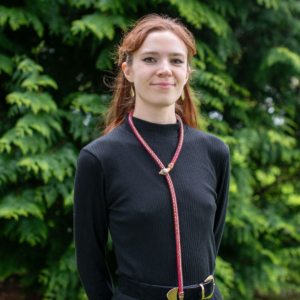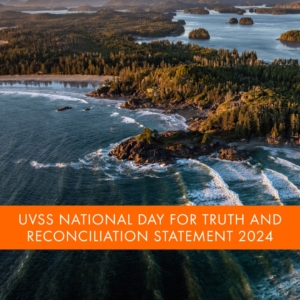What is a self location and why is it important?
The act of self location is a refusal to accept colonialism and is the beginning step to understanding your unique role in how you came to be on this land. It requires settlers, for maybe the first time ever, to consider how they arrived here, why they are here, who they share space with and what that means for others. It is to learn about yourself then use that knowledge to inform how you move through this space and your relationships with the land, the people, and decolonization.
The UVSS is guided by the unique lived experiences of the twenty-two students that make up the Board of Directors. Our intersectional identities guide our work– consciously or unconsciously. To understand our positionality better and who we are the UVSS lead directors have all written personal self locations that will be shared below.
UVSS Lead Director Self Locations
Read Michael’s Self Location
Michael Caryk, Interim Director of Campaigns & Community Relations
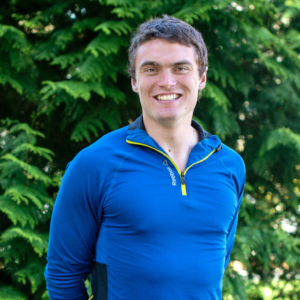 Hello, my name is Michael Caryk. I was born and raised in Winnipeg, Manitoba, on Treaty 1 Territory—the traditional lands of the Anishinaabeg, Ininiwak, Anisininew, Dakota Oyate, and Dene, Inuit peoples, and the National Homeland of the Red River Métis.
Hello, my name is Michael Caryk. I was born and raised in Winnipeg, Manitoba, on Treaty 1 Territory—the traditional lands of the Anishinaabeg, Ininiwak, Anisininew, Dakota Oyate, and Dene, Inuit peoples, and the National Homeland of the Red River Métis.
As a white settler, I acknowledge the privileges I hold living on these lands and the responsibilities that come with that. I’ve also had the opportunity to live in Ontario and British Columbia—territories with their unique histories of colonization, resistance, and ongoing Indigenous presence.
These experiences have shaped my understanding of the cultural richness of Indigenous nations and the deep impacts of colonialism— ongoing today through the continued control over Indigenous lands and the marginalization of Indigenous knowledge and languages. Growing up in Winnipeg, I witnessed firsthand how the legacy of colonialism remains present in our public spaces. For example, a major roadway was long named after Bishop Grandin, a figure associated with the residential school system. It was recently renamed Abinojii Mikanah, meaning “Children’s Way” in Anishinaabemowin, to honour the children who never returned from residential schools. This change represents a meaningful step toward acknowledging past harms and making space for truth and reconciliation.
As the UVSS Campaigns Director, I recognize the importance of approaching this work with a commitment to accountability and relationship-building. I am committed to ongoing learning and to using my role to support advocacy rooted in truth, reconciliation, and Indigenous sovereignty
Read Griffin’s Self Location
Griffin Foster, Director of Outreach & University Relations
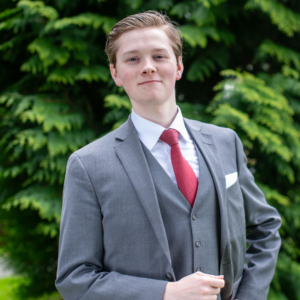
Living on the lands of this province over the 20 years of my life, I have grown an appreciation for
the value and beauty of these territories, and an understanding for the deep connection the Indigenous
peoples of this area feel to this land. I have lived most of my life on what was once known only as the
territory of the lək̓ʷəŋən peoples, and continue to live, learn and work here.
I have also gained a greater understanding, but an ever evolving one, of the discrimination and
oppression faced by racialized minorities in this country, especially and most pervasively the Indigenous
peoples of this country. The systems and culture of our society continue to disadvantage and grievously
wound the freedoms, safety, and dignity of Indigenous peoples across this country, in ways that demand
an ongoing commitment to justice and equality from everyone, but especially those people in positions of
privilege such as myself.
It is an irrefutable fact that I am a person in a position of extraordinary and unearned privilege,
with opportunities and comforts unavailable to so many of my fellow citizens. As such, it is incumbent
upon myself and others like me that we strive to approach our institutions and norms with a critical eye,
and with the historical crimes against Indigenous peoples in mind. It is not enough to say as much, we
must make critical changes. I endeavour to bear in mind the privilege and prosperity I possess has caused
so much unnecessary suffering and injustice over the course of generations before, and that we cannot
allow these cycles of oppression to continue.
Read Katie’s Self Location
Katie King, Director of Student Affairs
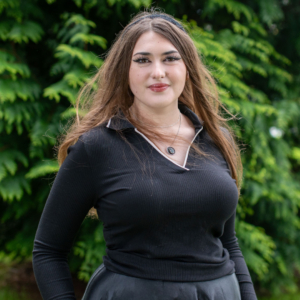
Read Lindsey’s Self Location
Lindsey Andrew, Director of Events
My name is Lindsey Andrew and I grew up on Treaty 7 territory in southern Alberta. Treaty 7 territory belongs to the Siksika, Kainai, Piikani, Stoney Nakoda, and Tsuu T’ina. These five First Nations lived on that land for centuries before it was stolen by the Hudson’s Bay Company and dubbed Rupert’s Land. Following Confederation, the dominion government sought to extinguish Aboriginal land title while the five First Nations of Treaty 7 sought peaceful coexistence with settlers. Treaty 7 was created under these circumstances and exists today as both a colonial institution and as a pathway for Indigenous legal recognition. Now I work, study, and live as an uninvited guest on the unceded lands of the Lək̓ wəŋən (Songhees and Esquimalt) and WSÁNEĆ Peoples. It has been a privilege to learn more about the history of the Indigenous peoples of so-called Vancouver Island over the course of my degree.
As a white settler, I want to reflect on the numerous privileges that I only have because of the ongoing displacement and dispossession of Indigenous lands and peoples. My grandfather worked in government and both of my parents worked in oil and gas. Settler-colonialism and extractivism have given my family the prosperous life that we enjoy here in so-called Canada. I do not want to be naïve in understanding the many ways in which settler-colonialism as both a historical event and an on-going structure have benefited me. While I am grateful for the life that I have in this country, it is necessary to acknowledge that Canada as we know it only exists because of deep historical injustices and ongoing genocide.
Read Jonah’s Self Location
Jonah Arnold, Interim Director of Finance & Operations
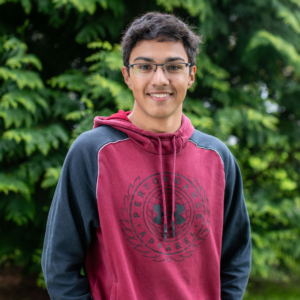
I’ve lived in Canada my whole life, and I’m amazed at how long it took for me to be taught about this country’s colonial foundations. I didn’t have an inkling of what the Indigenous peoples here have gone through until I started doing my own research, as the topic was completely neglected in primary school while only lightly touched upon through the rest of my pre-university education.
I was even somewhat dissuaded in my studies by the common reasoning of, “my ancestors committed these atrocities, why should I take responsibility for their mistakes?” I grappled with this question until I found the answer, which is actually quite obvious: the entire nation of Canada, with all the systems (laws, education, government, etc.) that I’ve benefited from, is inherently colonial. Regardless of my position on the issue, I have been supported by a framework that was built on the suffering of others; Indigenous people in Canada are systematically oppressed by this very framework. I end up receiving generational benefits while they end up carrying generational trauma. This doesn’t mean that I’m responsible for what my ancestors did, but it does mean that I’m responsible for righting their wrongs and reconciling with those that are still suffering from the very system that raised me.
Where we live is known as Douglas Treaties Territory, otherwise known as the Vancouver Island Treaties. James Douglas came here with the task of colonizing this land for the Crown in the 1840s-50s, in which during four years he made 14 land “purchases.” The reason for quotations is that the ledgers signed by Indigenous leaders were entirely blank, with meaningless verbal assurances being provided by Douglas instead. The actual terms were drafted several months after signing. They were promised several Treaty Rights, of which none were actually given when the terms were laid out. In fact, Treaty Rights for these peoples weren’t even recognized by the Canadian government until the 1960s. Among the affected treaty members are the W̱SÁNEĆ (Tsartlip, Tseycum, Tsawout, & Pauquachin First Nations) and Lək̓ʷəŋən (Songhees & Esquimalt First Nations). They, and others, are still dealing with the effects of these treaties.
My mother’s side is Indian, and her family lived under British colonization for many years, while my father’s side is French and were among the first settlers in Eastern Canada. It’s difficult to comprehend the almost paradoxical nature of my ancestry; I’m a product of oppressors and the oppressed. I think my existence shows, even if only symbolically, that these two opposites can be reconciled. The best progress comes through unity, and with enough understanding, empathy, and knowledge, I believe we can get there.
